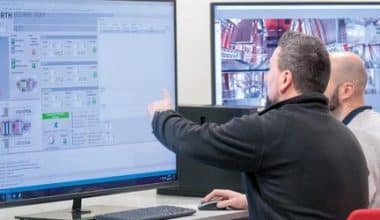For a manufacturing business to be successful, production management must be perfected. Production management can be defined as an optimization problem. Production management’s ultimate goal is to maximize the efficiency of your production line with your current resource capacity — manufacturers require product management. In this article, we will look at production management, operations management, the certificate, why production and operation management information is important, their software, and how you can use them to benefit your business.
What is Production Management (PM)?
The process of managing the conversion of production inputs (raw materials, labor, and capital) into production outputs (the goods that a company produces) is known as production management. It is an essential component of overall business management and entails supervising both the planning and execution of the manufacturing process. To implement the company’s product strategy, PM entails managing physical materials and inventories, as well as adherence to design specifications, equipment utilization, performance, and labor.
Harmonizing all critical aspects of production is the responsibility of production management. These are sometimes referred to as the “5 Ms of production,” which are as follows:
- Men (workforce and labor)
- Machines (equipment)
- Methods (production processes, workstations, and routings)
- Materials (raw materials, components, and/or subassemblies),
- Money (financing and asset utilization)
Effective and continuous PM is essential to attaining efficiency gains and keeping the production process current. A well-designed and executed manufacturing operation results in increased profits, controlled costs, and an improved bottom line.
What are the Key Areas of Production Management?
Because product management necessitates the coordination and supervision of both people and materials, managers must make decisions in four key areas regularly:
#1. Production Planning
The master schedule is created during the production planning stage. Managers must decide where to start production. It is also necessary to determine when production will begin. Because different products run at different speeds and require a variety of inputs, the decision to when is based on the overall product mix.
#2. Production Control
The implementation of design specifications on the factory floor is called production control. Managers direct staff and equipment to complete their part of a finished good, much like a traffic officer in a busy intersection. This also involves active management against quality standards as well as close monitoring of product speeds against established measured run times.
#3. Process Enhancement
Monitoring and driving continuous improvement is the responsibility of all production managers. Many companies use methodologies such as Lean or Six Sigma to formalize their efforts. Still, no process is static, and product management relies on honing and approving floor-level process activities of equipment and labor.
#4. Equipment Maintenance
Just as production managers must monitor and coach employees to complete tasks in the most efficient manner possible, equipment must also be managed to ensure that it is in good working order. Maintenance costs are typically rolled into fully costed finished goods, particularly for manufacturers using a cost-plus system to determine costs and set prices. Because of this, overall equipment effectiveness (OEE) is crucial.
Production Management Certificate
By producing goods and services that meet the needs of their customers, PM enables organizations to achieve their sales and business objectives. As a result, businesses hire production managers to oversee the manufacturing process and coordinate production activities. As a result, they seek knowledgeable candidates, who have practical skills, and standard certifications that demonstrate their knowledge.
So, if you are someone who wishes to build a career in production and supply chain management, then stay with us till the end, as here you’ll find the Best Production Management Certificate and Courses.
Best Production Management Certificate
People who want to start a career in PM should come here because we offer the best production management certificate offered by the most well-known online educational sites and institutes, which will boost your skills and validate your knowledge on various professional platforms and your CV.
#1. Certified Production Manager Course by Vskills
You will learn how to manage a company’s production process in this course. It teaches you how to effectively schedule and manage the product’s cost, performance, and quality. Furthermore, it puts your skills to the test in areas such as forecasting, scheduling, capacity planning, PPC, inventory, JIT, and quality management.
#2. Manufacturing Production and Operations by IoSCM
The course is specifically designed for candidates with little experience in supply chain management who want to pursue a career in this field. It aids in the development of key production planning skills and the knowledge necessary to comprehend effectively manufacturing planning, scheduling, and control.
#3. Advanced Diploma in Production Management by ISBM
This one-year course focuses on participants’ professional development. It enables you to gain practical skills that will help you advance in your career as a production manager. The best part about this program is that it is open to students of all backgrounds and professions who want to improve their production and quality management knowledge.
#4. Production management by Swayam
This PM program includes strategic planning, operational aspects, the planning function in production management, and PM control and measurement.
#5. Advanced Diploma in Production and Operation Management by Alison
This free production and operation management course teaches you the role of production and operation management during the product development phases. It also aids in your comprehension of the requirements for effective inventory management, production planning issues using linear programming, and the concept of total quality management.
Operation and Production Management
Operations management is similar to product management in that it is responsible for the day-to-day operations and production of the company, ensuring that operations and production are carried out efficiently and smoothly; this also includes administrative, factory-level, and service management.
Your operations management should have the customer as its focal point. If the customer is satisfied, you’re on the right track. However, how you manage your resources is also a function of operation management, because you want to improve customer satisfaction while minimizing resource waste. What, then, are the responsibilities of operation management?
#1. Strategy
From raw inventory management to routing manufacturing, operation management requires you to develop plans and tactics that will help you achieve lean inventory and a smooth production flow to gain a competitive advantage over your competitors.
#2. Product design
This is where you should look into whether your product meets the needs of your customers and follows market trends. Yes, your product may have survived the prototype stage, but people’s needs and wants change, and you must be prepared to adapt your product to changes in manufacturing trends and predictions.
#3. Forecasting
Demand planning will allow you to understand how your product is performing in the market and decide how to proceed, whether that is to increase, decrease, or even stop the production of a product.
And that’s the ins and outs of operation management, and as you can probably tell, there isn’t much of a difference between production management and operation management.
What is the Difference Between Production and Operations Management?
Production and operations management is an all-encompassing term that refers to the management of the production of your products and those finished goods and services. “Aren’t those two technically different areas?” you might ask.
“Traditionally, a manufacturer would create its products and ship them to a third party, and that was the end of it.” However, as more businesses gain control over their company and brand, they have begun to incorporate customization into their production.
We must balance production and operations management as we gain control over more aspects of our business.
The distinction between PM and operations, products, and services has become increasingly hazy as manufacturers have shifted toward a direct-to-consumer brand and even retailers now manufacture their own branded products. The main distinction between PM and OM is:
- PM – Monitoring and managing the manufacturing of products.
- OM – The services provided to customers as well as the work required to complete the production.
Why is Production and Operations Management Important?
Production management and operation management are not only recommended but also required, to improve certain aspects of your business. Otherwise, your company may struggle to meet orders and lose customers. As a result, as a manufacturer, you can:
#1. Achieve business objectives
By conducting a production and operation analysis, you will be able to meet business objectives by producing goods and services that meet the needs of the customer efficiently. This will increase customer satisfaction, which will increase sales and profit.
#2. Improve brand recognition
Production and operations analysis is crucial for D2C manufacturers because it helps you establish a reputation as a company that offers high-quality goods at reasonable prices.
#3. Reduce manufacturing costs
To achieve lean manufacturing, a PM system is essentially used. By optimizing your manufacturing output, you can expect to lower your manufacturing costs, either by not having resources idle or by determining the best way to keep inventory, such as using ABC inventory.
Production Management Information
The process of managing all the information needed to market and sell products through distribution channels is known as product information management (PIM). This product data is created by an internal organization to support a multichannel marketing strategy. A central hub of product data can be used to distribute information to sales channels like e-commerce websites, print catalogs, marketplaces like Amazon and Google Shopping, social media platforms like Instagram, and electronic data feeds to trading partners.
Furthermore, PIM plays a significant role in lowering the abandonment rate by providing better product information. PIM solutions are most relevant to B2C and B2B companies that sell products through a variety of sales channels in a variety of industries.
PIM manages customer-facing product data needed to support multiple geographic locations, multilingual data, and maintenance and modification of product information within a centralized product catalog. Also, PIM can serve as a centralized repository for product information from all channels.
Product information kept by a company may be dispersed across departments and held by employees or systems rather than being available centrally; data may be saved in various formats or only be available in hard copy form. It also assists businesses in improving conversion rate optimization (CRO) by displaying consistent branding and lowering abandonment rates.
Furthermore, PIM enables the automation of the majority of the product creation processes. Overall, PIM provides a centralized solution for media-independent product data maintenance, efficient data collection, data governance, and output.
Software Production Management
Although the concept of systemized PM is not new, companies now have tools at their disposal that were not previously available. The system described above can be taken to the next level by production management software, which focuses on improving all areas by identifying deeper levels of data that can be turned into improvements. It also automates many functions, reducing both time and human error.
Production management software can provide the following advantages:
#1. Cloud-Based
The majority of software solutions available today are cloud-based. This means that manufacturers who use these platforms do not need a large infrastructure or an IT presence to deploy them. This is especially important for small and medium-sized businesses (SMBs), which may lack in-house IT skills and cannot afford a traditional enterprise-level system.
#2. User-Friendly and Intuitive
The software is also more user-friendly, with intuitive dashboards, drop-down menus, and drag-and-drop functionality to make tasks easier. This could take the form of drag-and-drop scheduling or purchasing process automation. In situations like these, rules-based logic can automate these and other tasks, removing the need for manual oversight.
#3. Analytics
Deep analytics are used in today’s production management software to automate and produce more accurate views of the workflow and the entire production operation. This includes reporting on the shop floor, workforce and labor utilization, equipment loading, and more. To maintain standard adherence and to enable managers to make decisions in real time with accurate data, it aligns the bill of materials (BOM) with manufacturing routing and uses real-time production performance data.
#4. Interoperability
The existence of siloed data was a traditional barrier to improving PM. Because each department and support area maintained its own systems and software for managing data, information was not real-time and had to be reconciled before it could be acted upon at higher levels. Production management software can now integrate with third-party applications via APIs.
#5. Customizable
In today’s hyper-competitive markets, agility and flexibility are crucial. Furthermore, production management software is customizable, allowing businesses to leverage flexibility by only utilizing the functionality they require. This enables manufacturers to use only the functionality that is required, reducing clutter in the user experience and increasing efficiency. It is flexible and adaptable enough to include modules for CRM, inventory control, supply chain management, and procurement, but it can also be used specifically for the production.
Production management in manufacturing is the systematic application of techniques and methods that enable managers to control production and deliver the lowest cost, highest quality finished goods in pursuit of business goals. It can be implemented in any size factory and improved by utilizing production management software.
What are the four functions of production?
Land, labor, capital, and entrepreneurship are the four production factors.
What is the role of production management?
Production management is the process of managing a company’s activities to produce desired outputs of goods and services.
What are the benefits of production management?
- It lowers manufacturing costs.
- It increases market competitiveness.
- You have a better chance of achieving business goals.
- It has the potential to significantly improve your overall brand image.
- You can make the best use of all of your resources.
What are the elements of production management?
Men, machines, methods, materials, and money are the “five M’s” of production management. The term “Men” refers to the human component of operating systems.
What are the basic principles of production management?
Planning, organizing, directing, and carrying out production activities are all part of production management. The ultimate goal of any production management solution is to transform a collection of raw materials into a finished product.
Conclusion
Because production management is a relatively new field and the role can vary greatly from organization to organization, it is tempting to characterize it as a mashup of other positions. Unfortunately, this strategy frequently results in a mismatch between what makes a product manager appear good on paper (for example, an architect who knows some programming or a developer with an M.Sc.) and what makes a product manager effective in their day-to-day job.
Related Articles
- PRODUCTION MANAGEMENT SYSTEM: Types, Features, and Top Software Solutions
- PRODUCT MARKETING STRATEGY: Overview, Examples, Job Description (+ free courses)
- Practice Management Software: Definition & Top Picks
- BUSINESS OPERATIONS: Definition, Examples, And Management






